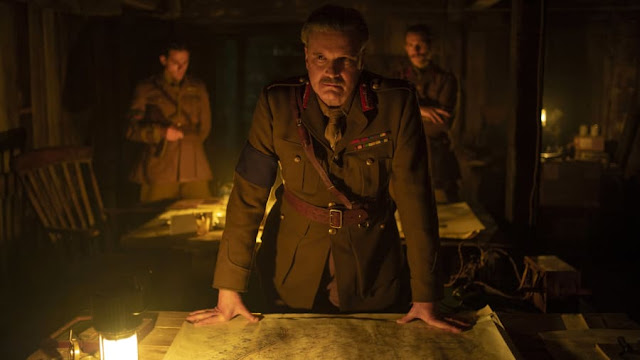1917
There's no denying how impressive 1917, director Sam Mendes' 2019 film is on a technical level. Cinematographer extraordinaire Rogers Deakins, whose Oscar winning work was the first to employ the Arri Alexa Mini, is clearly the MVP on this picture. Digital photography of course, but it still looks fabulous. The English countryside locations, doubling for France, are perfect. One can appreciate this film for these aspects alone. If Mendes, who based his script (co-written by Krysty Wilson-Cairns) on remembrances passed down from the trenches by his grandfather, was aiming for a tight lipped account, I would rate it higher. But it is clear that the director is going for emotional impact, and for me it fell short.
WW 1. The story follows two British Lance Corporals as they set out on a dangerous mission across the Western Front in France to reach their brothers in the Second Battalion at the Hindenburg Line, to warn them that their scheduled attack on the Germans is a mistake, a walk into an ambush. As telephone lines had been cut, the boys must deliver a letter from their General on foot. Will Schofield (George MacKay) and Tom Blake (Dean-Charles Chapman), whose brother is one of the 1,600 souls in the Battalion, will suffer a perilous journey through corpse filled moats and underground barracks filled with rats and tripwires. They will learn that no good deed goes unpunished when they try to help a downed German pilot. Only one will reach his destination.
While 1917 is not what one would call action packed, it does often resemble a video game. The actors even move like computer generated soldiers. There's a fascination, an undeniable involvement, and some suspense. Tragedies occur, but they and the entire movie felt hollow. Hard to say why. Mendes doesn't contrive tears, but his quiet takes on injury and death are just cold and muted. A British thing? I have to blame the screenplay for not fleshing out these characters, who we do learn a bit about. The actors are fine but perhaps more accomplished ones would've made up for these deficiencies. A scene in which a woman and a baby are discovered felt tacked on to give the film some heart, and didn't work at all.
You probably know that the film is made to resemble to long unbroken takes. Lee Smith's editing does the job, and I wasn't as obsessed at looking for seams as I was expecting. I go back to Deakins, who once again stuns. Mendes and he create many striking compositions. I just wish there was more depth to this film. Let me also carp about Thomas Newman's far too traditional sounding score.....



Comments